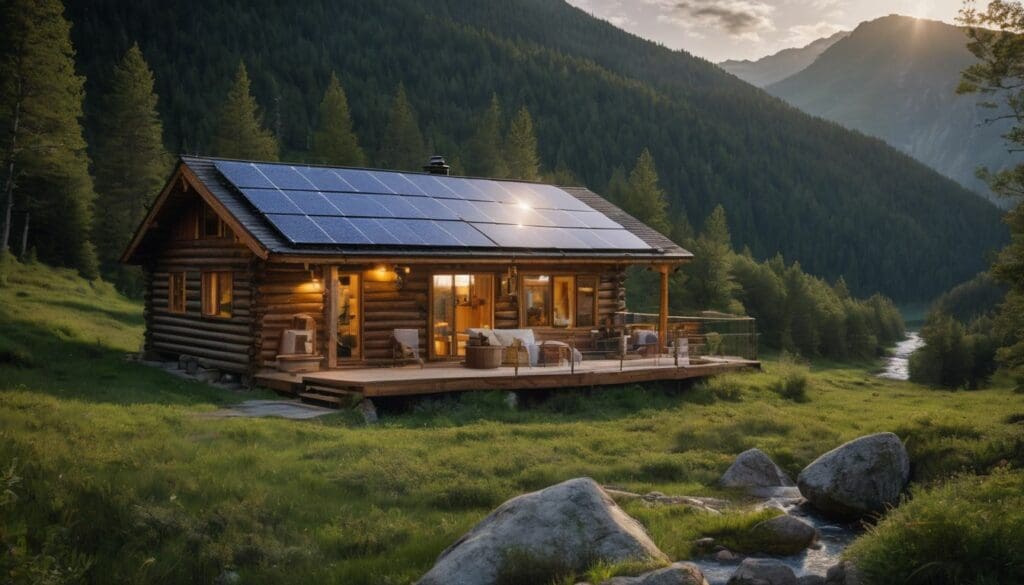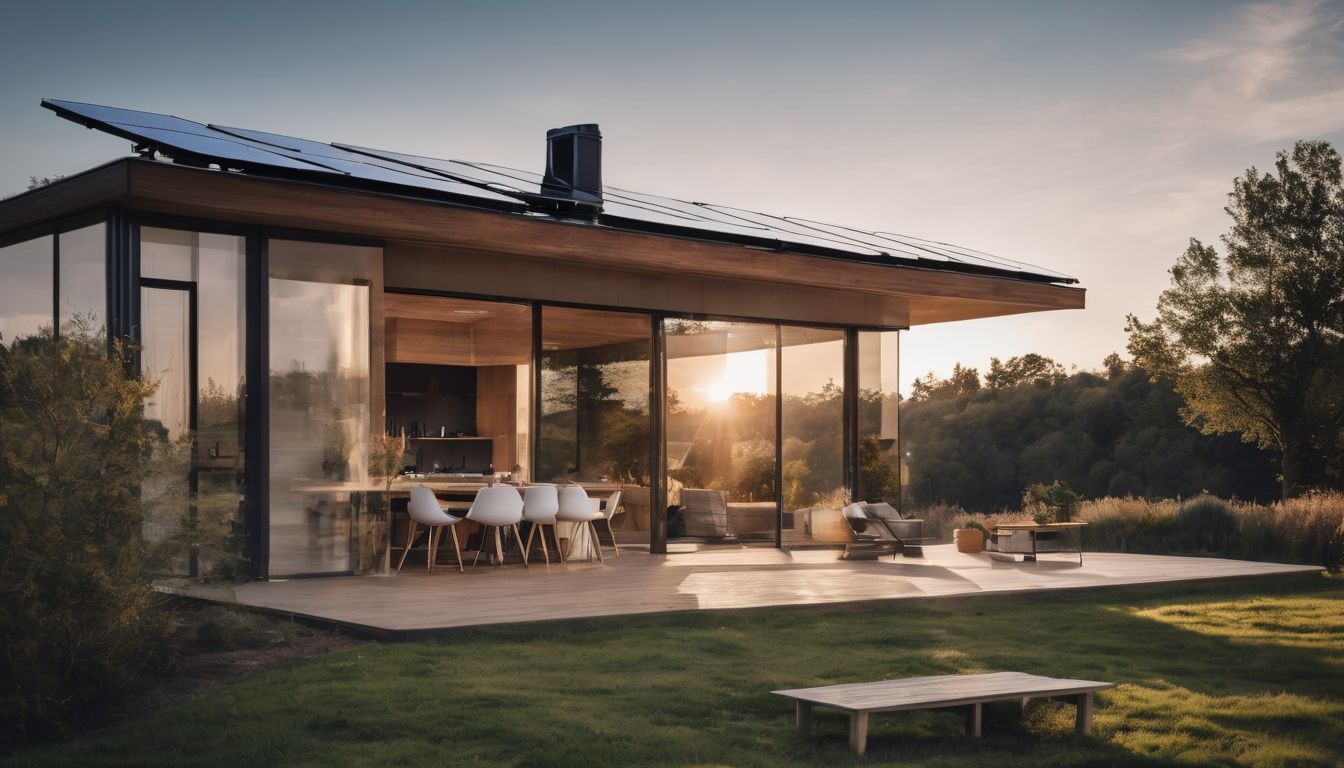As bills soar, more people are seeking to cut costs and live sustainably. In recent years, one in four homeowners has considered solar power as an energy alternative. Our guide will show you the bright side of off-grid living, from slashing expenses to boosting eco-friendliness.
Discover a brighter future below!
Key Takeaways
- Off – grid living offers a sustainable lifestyle, allowing people to produce their own power using solar panels or wind turbines, manage water through methods like rain harvesting, and handle waste with composting toilets.
- Solar technology has become more affordable and accessible, leading to its widespread adoption in off-grid applications such as street lighting and film production, where it provides clean energy and reduces carbon emissions.
- People who choose off – grid lifestyles can save money by reducing utility bills; these savings are amplified over time as the cost of installing renewable energy systems continues to drop.
- Environmental sustainability is a core advantage of off – grid living; by relying on renewable resources instead of fossil fuels, individuals reduce their ecological footprint and promote a healthier planet.
- Communities worldwide are benefiting from off-grid systems that offer reliable electricity for basic needs like lighting and refrigeration, contributing to local development while upholding principles of eco-friendliness.
What is Off-Grid Living?
Off-grid living means setting up a home that doesn’t rely on public utilities like electricity, water, or sewer systems. People who choose this lifestyle typically use alternative energy sources like solar panels and wind turbines to generate power.
They also find innovative ways to manage water through rain harvesting or wells and tackle waste with composting toilets or septic tanks.
This way of life appeals to those seeking environmental sustainability and self-sufficiency. It challenges individuals to think creatively about daily needs while making choices that reduce their carbon footprint.
Off-grid homes can exist anywhere, from remote rural areas to urban spaces designed for eco-friendly living. Next up, let’s delve into how the rise of solar panels has revolutionised off-grid living.
The Rise of Solar Panels and Off-Grid Living
As solar technology advances, it has become more accessible for off-grid living. From solar street lights to portable power for film production, the rise of off-grid solar energy has brought about a range of success stories and practical applications.
Solar street lights
Solar street lights offer a sustainable and energy-efficient lighting solution for environmentally conscious communities. Harnessing solar power, these lights operate independently from the main electrical grid, reducing reliance on non-renewable resources.
The installation of solar street lights not only promotes sustainable living but also contributes to lower energy costs and reduced carbon emissions.
Additionally, solar street lights enhance safety by illuminating dark areas, providing a secure environment for pedestrians and drivers alike. Through the use of renewable energy, communities can embrace eco-friendly practices while promoting independence from traditional power sources.
Portable solar power for film production
Portable solar power is revolutionising film production, providing a sustainable and independent energy source for remote shooting locations. Solar generators are compact, easy to transport, and can be set up quickly to provide clean energy for lighting, cameras, and other equipment needed on set.
This eco-friendly solution reduces the reliance on noisy and polluting diesel generators while offering an affordable alternative that aligns with environmentally conscious filmmaking practices.
Empowering film crews to operate off-grid, portable solar power systems contribute to reducing carbon emissions associated with traditional energy sources in film production. These systems also support conservation efforts in natural settings by minimising the impact of filming operations on the environment.
Success stories of off-grid solar energy adoption
Transitioning from the portability of solar power for film production, success stories of off-grid solar energy adoption highlight its impact. Here are some inspiring examples:
- Rural communities in Africa now have access to electricity through off – grid solar systems, improving living standards and economic opportunities.
- Off – grid solar initiatives in India have provided reliable power to remote villages, enhancing education and healthcare services.
- Small island nations are achieving energy independence with off-grid solar solutions, reducing reliance on costly imported fuels.
- Off – grid solar technology is transforming disaster relief efforts, providing essential power during emergencies and aiding recovery efforts.
- Indigenous communities in Australia are embracing off – grid solar energy to preserve their traditional way of life while reducing environmental impact.
The Benefits of Off-Grid Living
Experience the freedom of self-sufficiency, cost savings, and environmental sustainability by embracing off-grid living. Read more to learn about the advantages and opportunities it offers.
Energy independence
Living off the grid provides a sense of energy independence. By harnessing solar power, off-grid individuals can generate their own electricity, reducing reliance on traditional energy sources.
This not only offers self-sufficiency but also contributes to a more eco-friendly lifestyle by decreasing one’s carbon footprint. Off-grid living empowers individuals to take control of their energy consumption and production, aligning with the values of environmental conservation and sustainability.
Off-grid living promotes personal responsibility for energy usage and production. By embracing renewable technologies like solar panels, individuals can achieve greater autonomy over their electricity needs.
Cost savings
Transitioning from energy independence to cost savings, off-grid living presents significant financial benefits. By harnessing solar power and other sustainable resources, residents can significantly reduce their reliance on traditional electricity sources, leading to substantial savings in the long run.
This not only reduces monthly utility bills but also provides a return on investment as off-grid systems require minimal maintenance and have lower operating costs.
Furthermore, the initial setup of an off-grid system may involve some upfront costs; however, over time, this investment pays for itself through reduced energy expenses. Additionally, as technology advances and becomes more cost-effective, the overall expense of setting up an off-grid system continues to decrease making it an increasingly viable option for those seeking environmentally friendly alternatives while saving money in the process.
Environmental sustainability
While off-grid living offers significant cost savings, it also promotes environmental sustainability. By reducing reliance on traditional energy sources, off-grid living lowers carbon emissions and minimises the ecological footprint.
Embracing renewable energy solutions such as solar power contributes to a cleaner and healthier planet, aligning with the values of eco-friendly individuals dedicated to conservation and sustainable living.
Adopting off-grid systems like solar panels not only benefits individual households but also creates a positive impact on the environment by promoting self-sufficiency and reducing dependence on non-renewable resources.
Improved safety
Off-grid living enhances safety by reducing the reliance on centralised electricity, which can be vulnerable to disruption. With self-sustaining solar and other off-grid systems, there is less risk of power outages or blackouts, providing a more secure energy source.
This empowers communities to feel safer and more confident in their energy supply.
Off-grid living increases safety through reduced dependence on traditional utility infrastructure. By embracing sustainable alternatives such as solar power, individuals and communities are better equipped to mitigate potential hazards associated with unreliable electrical grids.
Technological advancements and increased efficiency
Transitioning from the importance of improved safety, embracing off-grid living involves harnessing technological advancements for increased efficiency. Solar panels have revolutionised off-grid living by providing a sustainable and reliable source of energy.
These advanced systems allow individuals to achieve self-sufficiency while reducing environmental impact. Remote monitoring and control technologies enable users to manage their electricity consumption efficiently.
This level of precision ensures that every watt produced is used effectively, maximising energy independence and cost savings while promoting an eco-friendly lifestyle.
Leveraging solar technology in off-grid living empowers communities to embrace a self-sufficient and environmentally friendly way of life. The continuous development of solar power solutions amplifies the potential for achieving complete autonomy from traditional grids, fostering independence in various aspects such as water systems and housing needs.
The Role of Solar Panels in Off-Grid Living
Harnessing solar power is essential in off-grid living, empowering communities to achieve self-sufficiency and reduce their environmental impact. Want to learn more about the benefits of off-grid living with solar energy? Keep reading!
Harnessing solar power
Solar power is harnessed from the sun’s rays using solar panels. These panels convert sunlight into electricity, providing a sustainable energy source for off-grid living. Solar power systems are crucial in achieving self-sufficiency and reducing reliance on traditional grid electricity.
By utilising solar power, individuals can enjoy eco-friendly and cost-effective energy solutions while minimising their environmental impact.
Off-grid communities can benefit from harnessing solar power by gaining access to reliable electricity without depending on conventional utility companies. This approach empowers these communities to embrace a more sustainable lifestyle while embracing energy independence and contributing to environmental conservation efforts.
Empowering off-grid communities
By harnessing solar power, off-grid communities are empowered to become self-sufficient and resilient. Solar panels provide a reliable source of electricity for remote areas, enabling residents to have access to essential amenities such as lighting, refrigeration, and communication devices.
This newfound energy independence contributes to the economic development of off-grid communities while reducing their environmental impact through the use of clean and renewable energy sources.
The implementation of off-grid solar systems fosters self-sufficiency by allowing these communities to generate their own electricity without relying on traditional grid infrastructure.
Achieving self-sufficiency
Off-grid living enables individuals to achieve self-sufficiency. Harnessing solar power and other off-grid technologies empowers communities to generate their own electricity, manage water systems, and establish sustainable housing solutions, fostering independence from traditional infrastructure.
Living off the grid allows for an eco-friendly lifestyle that promotes energy autonomy and reduces reliance on centralised resources. Embracing self-sufficiency through off-grid living supports conservation efforts and contributes to a more environmentally sustainable future.
For those seeking self-sufficiency through off-grid living, harnessing solar power is just the beginning.
Conclusion
Embracing an off-grid lifestyle enables energy independence and cost savings. Living off the grid promotes environmental sustainability, enhances safety, and encourages technological advancements for increased efficiency.
Off-grid living with solar power empowers communities to harness sustainable energy sources for self-sufficiency. Achieving a self-sufficient, eco-friendly way of life is within reach through off-grid living with solar and beyond.
FAQs
1. What are the benefits of an off-grid lifestyle?
An off-grid lifestyle offers self-sufficiency, eco-friendly living, and freedom from utility grids. It allows for the use of solar systems and other renewable sources to generate electricity.
2. Can I have electricity while living off-grid?
Yes, you can have electricity while living off the grid through offgrid solar systems or alternative offgrid power solutions that provide clean energy.
3. Is it possible to get fresh water when living offgrid?
Absolutely! Offgrid water systems enable you to collect, store, and purify rainwater or natural water sources for all your daily needs.
4. How does an offgrid housing benefit me?
Offgrid housing gives you a sustainable home free from reliance on public utilities, potentially saving money and increasing your connection with nature especially if you’re living in the woods.
5. Are there any eco-friendly advantages to using an offgrid solar system?
Yes indeed! An Off-grid solar system harnesses sunlight to produce clean energy which reduces carbon footprint making it a highly eco-friendly option for powering your home or property.





